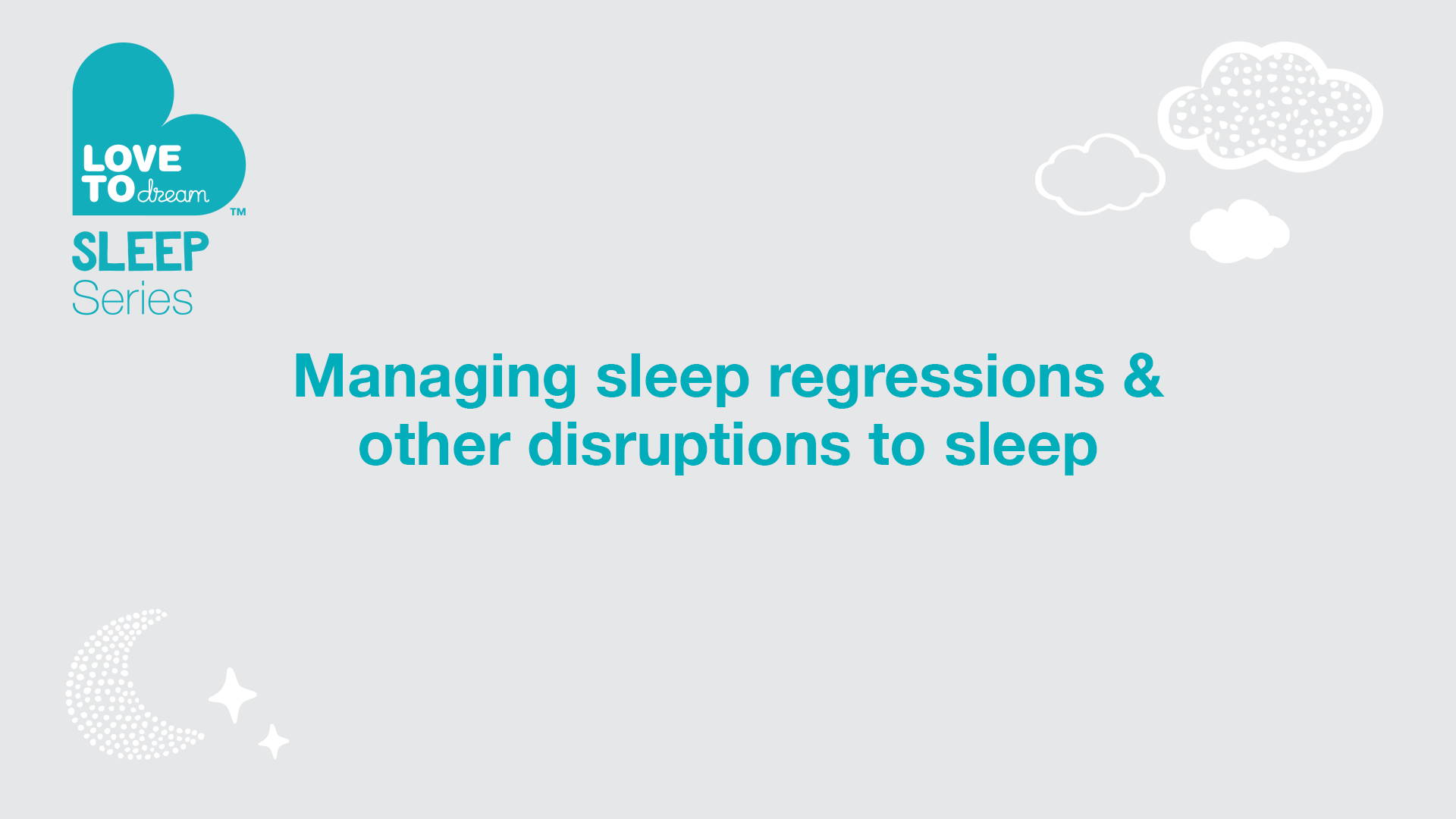MANAGING SLEEP REGRESSIONS & OTHER DISRUPTIONS TO SLEEP
As much as we hate to say it, there are going to be times when your baby or toddler’s sleep and settling may be disrupted. Illness, teething and hitting exciting developmental milestones can all cause a disruption to sleep. But don’t worry, if you’ve been working on laying the 4 foundations to healthy sleep, these disruptions should only be temporary and your precious sleep patterns and routines don’t have to come completely unstuck.
What is a sleep regression? A sleep regression is when you see a shift in your baby or toddler’s sleep patterns without an obvious cause like illness, teething or traveling. Your baby, who may have been sleeping soundly during the day and night, suddenly starts waking often during naps and overnight, and is difficult to settle back to sleep. You may experience these periods around 4 months, 8 months, 12 months and even 18 months and while no one wants any setbacks in sleep, the exciting news is that it’s happening because your little one is experiencing a developmental leap. That’s why some people like to call them ‘Sleep Progressions’.
If your baby does experience a sudden change in sleep and behavior, it’s important to always rule out sickness first. Don’t just assume they’re experiencing a sleep regression. Viruses, ear infections, even UTIs can all impact on how your baby is feeling and sleeping so don’t ever hesitate to take your baby to the doctor. If everything is fine during their check-up, you’ll know there’s no underlying pain or discomfort requiring medical intervention that’s causing the sleep and settling issues.
The “4 Month Sleep Regression / Progression”: The first time you hear people talk about a sleep regression is usually when a baby is about 4 months. Just as each baby is individual, these changes may happen a little earlier or later than 4 months and each baby’s experience will be different.
By 3-4 months old, a baby is much more alert and aware of their surroundings than when they’re a newborn and there’s a lot going on in their development. They may be reaching out to grab things, have better head control, start making new sounds and for many, this is the time you’ll see them learning to roll.
Just like everyone around them, your baby is super excited about all the new things they’re able to do. So when they’re moving into the lighter phases of their sleep, and transitioning from one cycle to the next, they’re more likely to wake, notice and be interested in their surroundings and want to practice their new skills. That self-soothing back to sleep they were starting to learn is no longer their priority!
Once your baby has started mastering their new skill and it’s no longer so new & exciting, their sleep should get back on track, but there are ways you can help manage and survive the disrupted periods (see more below).
Other periods of sleep and settling disruption: your baby may experience disruptions to their sleep again when they’re learning new motor skills like crawling, sitting, standing and walking, when they’re starting to talk and express themselves in new and different ways, when they’re getting older and start testing the boundaries, trying to prove their independence and of course, when they’re teething, sick, and or you’re travelling or leaving them in a new or different environment (like staying with relatives).
All babies and children will go through these stages and phases in some way. While you can’t avoid or control them, try to remember, these periods of change and disruption are temporary.
Here are some tips to help you survive and manage these periods of disrupted sleep:
- Try to stay calm. Remember this is temporary and a natural development. It shows your baby’s development is progressing and while it might take a couple of weeks, your baby’s sleep will get back on track. If your baby’s sleep is disrupted because of sickness, teething or travel, just remember what your sleep is like when you’re sick or jet-lagged – disrupted, right?!
- Stay consistent. You might need to offer a little extra support as your baby settles off to sleep or if they wake overnight and it might take a little longer than usual to get them to settle. If they’re sick or in a new environment, they may need more reassurance and comfort. It’s okay to be flexible, just try to stay consistent with your routines and the strategies you use as best you can.
- Remember the 4 foundations to healthy sleep. When we’re exhausted and desperate for our little ones to sleep it’s easy to try anything you can to get them drifting back to dreamland as quickly as possible. Remembering the tips and tricks, settling methods and ways to support your baby’s self-soothing covered in the Sleep Series will help you and your baby get through these periods of disruption and avoid you from forming any bad habits.
- Make sure your baby is getting enough sleep. Whether your baby is sick, teething, in a new environment or going through a period of development, it’s important they still get enough sleep across their whole day. If your baby had a particularly disrupted night, they may need to make up for it with extra or longer naps the next day. Remember, an overtired baby can be even harder to settle so keeping them well rested is key.








